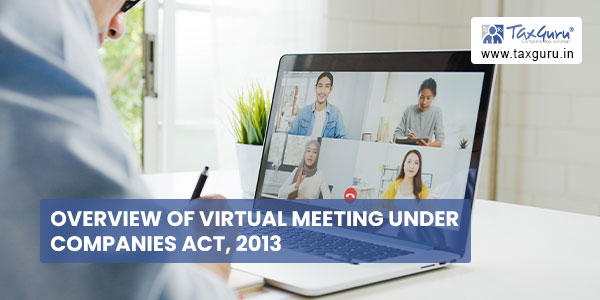A meeting held totally by means of either Video conferencing or other audio-visual means is known as Virtual Meeting.
In virtual meeting there is no physical presence of participants and there is no specified venue for the purpose of meetings. Participants that are located at different places can participate in the meeting either by teleconference or video conference or combination of them at time decided.
The potential gains are in terms of reduced travel costs, time-saving, efficiency improvements, and less environmental impact in terms of savings on fuel and transport.
The Commonly used software for Virtual meeting are Microsoft’s Skype for Business, Adobe’s Connect, Google’s Hangouts, or WebEx to name a few. The development of new technologies such as Voice over Internet Protocol telephony for an example of which is Skype and shared computer screens.

In virtual meetings, there is no physical presence of participants and there is no set location for meetings. Participants who are in different locations can join the meeting either by telephone or video conference, or a combination thereof, at the designated time.
Page Contents
Requirements for Virtual Meeting:
- Meeting rooms
- Software, which can be either purchased or can be provided by vendor for a fee on yearly rental basis.
- Hardware equipment such as Monitor or LED screen, Webcams.
- High quality mike system.
- Document scanners.
- Leased Lines.
- High speed wireless internet
- Recording & Storage Equipment for recording the proceeding and Proper storage for future reference as many be required under law.
- Have trial run before the meeting to make sure that all the systems for virtual meeting are working properly.
- Make sure that the proper arrangements are made in the Meeting room to conduct virtual meeting.
Virtual Annual General Meetings or Extra-Ordinary General Meetings
Section 108 of the Companies Act, 2013 provides for Voting through electronic means. The
Central Government may prescribe the class or classes of companies and manner in which a member may exercise his right to vote by the electronic means.
Advantages of Virtual Meetings
- Increase shareholder participation in meetings,
- Encourages more participation by investors across the world.
- If due to distance a shareholder is not able to attend the meeting then the company provides virtual meeting to them.
- Enables institutional investors to attend more than one meeting in a day and protect shareholders interest.
- Reduce the cost of holding and conducting shareholder meeting, including the costs of the venue, stationary, transport and refreshments.
- Saves time of the Company’s personal.
Disadvantages of Virtual Meetings
- Security of the systems used.
- Streaming with quality without interruption.
- Provide the shareholders with secure login and authentication for attendance, with ease of access for shareholders, and provide the facility of remote voting.
- Combined registration, voting and reporting software.
- Customized instant results screen and detailed audit reporting.
- Data Security of Logins and Passwords.
- Allowing the shareholders to choice of the device.
- The technology used must give all shareholders a reasonable opportunity to participate.
- As of today, holding of total virtual shareholder meeting is not allowed, at present Hybrid meeting are permitted. “Hybrid” refers to those meetings are combination of online participation as well as option of attending the meeting in-person. “Virtual meetings” are those conducted wholly online with no physical meeting of shareholders.
******
Author- Adv.Shivam Kumar
Legel and content Executive, Taxblock India Pvt. Ltd





